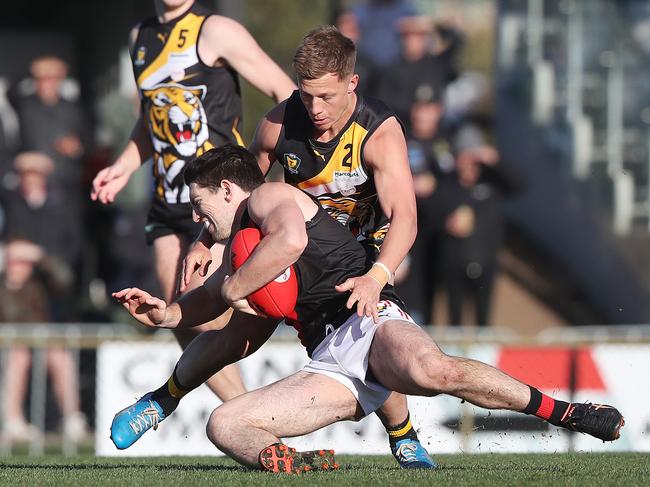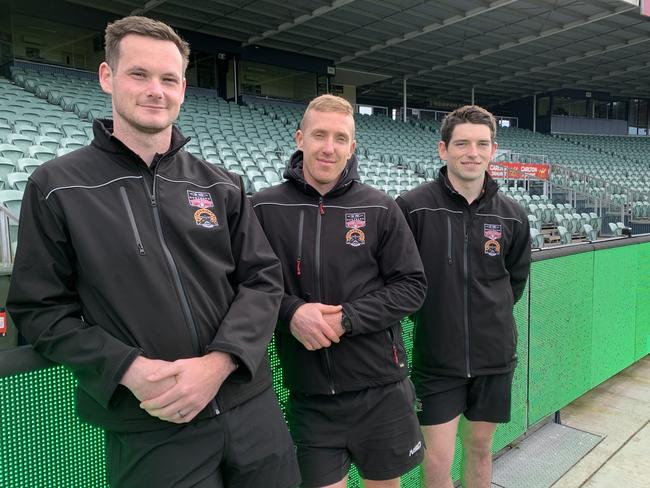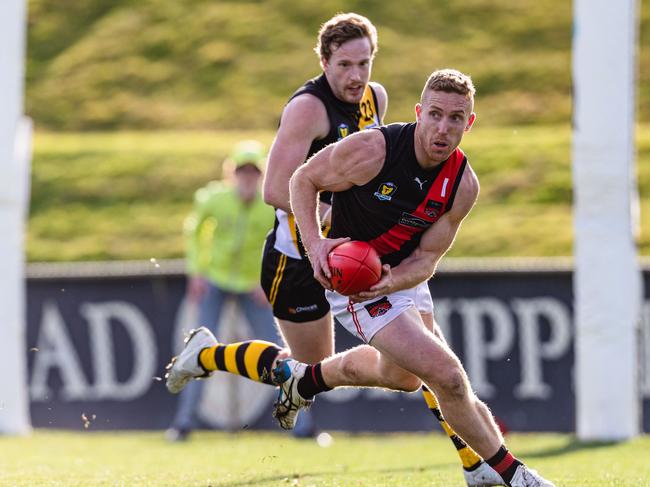‘Welfare first, results second’: TSL stalwart backs 21-day concussion standdown
North Launceston stalwart Brad Cox-Goodyer says clubs and leagues should put “welfare first, and results second” after the minimum return to play time for players concussed in community football was extended. And the Bombers have a recent case close to home to show why.

Sport
Don't miss out on the headlines from Sport. Followed categories will be added to My News.
North Launceston stalwart Brad Cox-Goodyer has urged clubs and leagues to “put player welfare first, and results second” after the AFL announced community level players will have to wait a minimum three weeks after a concussion before returning to play.
Cox-Goodyer pointed to the club’s cautious handling of former skipper Ben Simpson’s concerning head knocks in 2022 as a good example of why the tougher rules are needed.
On Wednesday the AFL confirmed the current 12-day stand-down period would be retained for AFL and AFLW, but all competitions below that would operate under the 21-day rule from this year.
Cox-Goodyer, the incumbent North Launceston coach, has stepped down from the job to take a new role as AFL Tasmania’s talent pathways skills acquisition coach.
He’s the Tasmanian State League’s games record holder, a two-time Alastair Lynch medallist, five-time premiership player and TSL life member.
In 2022, the Bombers told Simpson to take an extended break, around nine months, after he suffered symptoms from multiple head knocks.
He conceded leagues would have to find ways to police the rules, especially around finals time when players are desperate to play.
But he said the experience rammed home the necessity for stringent rules, and backs the 21-day change.
“There’s lessons to be learned from that. Hopefully players and coaches can see that, and put the player’s welfare first and results second,” Cox-Goodyer said.
“At the end of the day, that what matters the most.
“The elite level has that around the clock care, and the regulations to be really strict with that. “When players pass that 12-day threshold, they’ve had pretty strong monitoring to ensure there’s no further risk.
“With local competitions you don’thave that. The club or the league might not know what a player is doing in their own time, and how they’re looking after themselves.
“With the recent research and a lot of people coming out about their issues post footy, I think it’s obviously better to err on the side of caution.
“If that means you miss two or three games... it’s unfortunate but for the longevity of your health it’s a good move.”

Simpson, who has signed with SANFL club Norwood for this season, only played a handful of games in 2022 before he was stood down.
The Bombers’ approach was rewarded by Simpson’s stellar campaign last year, where he was joint winner of the club’s player of the year, guided the team to a grand final and represented Tasmania.
“It was a really delicate approach with him and we needed him at that stage, we lacked a bit of talent and experience,” Cox-Goodyer said.
“Yes, we needed him to be a better football side, but hearing the stories about him not being able to concentrate in front of his computer at work, we said ‘mate it’s not worth it. Your life is more important than our football club.’
“We reaped the rewards of that last year when he didn’t get a knock, or he might have got a knock but it didn’t affect him, and he had the best season of his life.
“He obviously wanted to get out there and play, but he understood going to work every day is what pays the bills. If he can’t do that to a high level because he’s getting knocked in the head at footy, he understood that’s an issue.
“He didn’t do contact footy for nine months and we saw the benefits last year. It is probably a good lesson for local clubs to look at someone like that.”
Cox-Goodyer said the experience had shown the benefits of players taking more time off than recommended to safeguard themselves.
The rules are in line with the Australian Institute of Sports Concussion and Brain Health Statement released earlier this year, which recommended a minimum of 21 days.
“The last knock he got wasn’t that bad, but we made the call you’ve just got to miss an extended period here and get right. If you’re getting disoriented or dizzy from a knock like that, there’s obviously a bigger issue,” Cox-Goodyer said.
“It’s like a meter. If you haven’t had a concussion before, you’ll bounce back quicker. But if you extend that period time you’re out after the first head knock, the next time you get one the meter doesn’t drop down as far.”

Cox-Goodyer said a strong plan will need to be implemented by leagues to ensure players are abiding by the rule.
“It’s going to be interesting, especially come finals time when someone might cop a head knock and they might be OK, but they might tell a fib,” he said.
“Hopefully clubs have the players’ welfare at the forefront of their mind, and not necessarily winning a game, because at the end of the day that’s what it is, it’s a game.
“Someone’s life is more important than that. If you can avoid having those repercussions down the line, it’s worth it.
“Hopefully Clubs in the NTFA and SFL and on the coast have those resources and doctors and trainers they can trust to make hard calls.
“They will have the final say, the coach doesn’t have the final say.”
It was revealed at an AFLPA meeting on Wednesday the AFL was looking at trialling new headgear at community level this year.
But Cox-Goodyer is sceptical if it would assist in preventing concussions.
“There is no scientific evidence that helmets work, and that’s what we found with Ben,” he said.
“He wore a helmet all of 2022 and got those head knocks, but didn’t wear a helmet once last year.”


